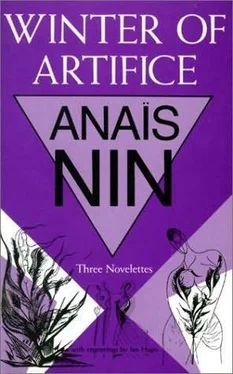Anaïs Nin - The Winter of Artifice
Здесь есть возможность читать онлайн «Anaïs Nin - The Winter of Artifice» весь текст электронной книги совершенно бесплатно (целиком полную версию без сокращений). В некоторых случаях можно слушать аудио, скачать через торрент в формате fb2 и присутствует краткое содержание. Год выпуска: 2007, Издательство: Sky Blue Press, Жанр: Классическая проза, на английском языке. Описание произведения, (предисловие) а так же отзывы посетителей доступны на портале библиотеки ЛибКат.
- Название:The Winter of Artifice
- Автор:
- Издательство:Sky Blue Press
- Жанр:
- Год:2007
- ISBN:нет данных
- Рейтинг книги:4 / 5. Голосов: 1
-
Избранное:Добавить в избранное
- Отзывы:
-
Ваша оценка:
- 80
- 1
- 2
- 3
- 4
- 5
The Winter of Artifice: краткое содержание, описание и аннотация
Предлагаем к чтению аннотацию, описание, краткое содержание или предисловие (зависит от того, что написал сам автор книги «The Winter of Artifice»). Если вы не нашли необходимую информацию о книге — напишите в комментариях, мы постараемся отыскать её.
“A handful of perfectly fold fables, and prose which is so daringly elaborate, so accurately timed… using words as magnificently colorful, evocative and imagist as any plastic combination on canvas but as mysteriously idiosyncratic as any abstract.”
—
The Winter of Artifice — читать онлайн бесплатно полную книгу (весь текст) целиком
Ниже представлен текст книги, разбитый по страницам. Система сохранения места последней прочитанной страницы, позволяет с удобством читать онлайн бесплатно книгу «The Winter of Artifice», без необходимости каждый раз заново искать на чём Вы остановились. Поставьте закладку, и сможете в любой момент перейти на страницу, на которой закончили чтение.
Интервал:
Закладка:
Now it was not altogether the dream, nor was it daylight. It was the place where many of the effects were due to shadow, to silences and to space. A marvellous mise en scene, such as human beings knew nothing of when they awakened. It was the moment when one was more than awake, a million times awake, awake backwards and forwards, with a circular fever faster than the rotation of earth, awake with a million eyes and a mouth that had said everything and was now struck with silence; a place so high that breathing ceased and divination began.
It was the twilight of mercury.
The room was turning black. She was splitting herself into two women, and she felt the half of her that was standing up and the half of her that was lying down.
It was here that everything happened to her. The daytime was only a sketch. In the daytime all the gestures were thickened by obstacles, by remembrance. Only in the dream was the loved one wholly possessed, only in the dream was there ecstasy without death. Life only began behind the curtain of closed eyelashes.
The woman who walked erect during the day and the woman who breathed and walked and swam during the night were not the same. The woman who breathed and walked during the day was like a cathedral spire and the opening into her being was a secret. It was inaccessible like the tip of the most labyrinthian sea shell.
But with the night came the openness.
The day body made of rigid bones, made rigid with fears and dissonances, was set against yielding. At night it changed substance, form and texture. With the night came fluidity. With the night there ran through the marrows not only blood which could always commingle with other bloods, but a mercury which ran in all directions, swift, mordant, uncontrollable, spilling and running in star points, changing shape at each breath of desire, spilling and dispersing without separating.
With the night came SPACE. No crowded city. The dream was never crowded. It was filtered through the prism of creation. The pressure of time ceased. Joy lasted longer and suffering less, or else all the feelings were telescoped into a second. Time was arranged and ordained by feeling. Fear was eternal, anger immediate and catastrophic. Sifted and enveloped in a mineral glow, each object of the eternal landscape appeared on the scene with space around it. The space was like an enormous silence in which there was no sword of thought, no rending comments, no thread ever cut. She walked among symbols and silence.
She ceased to be a woman. The secret small pores of the being began to breathe a life like that of plant and flower. She went to sleep a human being and awakened with the nervous sensibility of a leaf, with the fin knowledge of fish, with the hardness of a coral, with the sulphurous eyes of a mineral. She awakened with new finger tips, new tendrils, new wings, new legs, leaves, branches. She awakened with eyes at the end of long arms that floated everywhere and with eyes on the soles of her feet. She awakened in strands of angel hair with lungs of cocoon milk.
With the night came a multiplied breathing and new cells like honeycombs filled with a strange activity. Filling and refilling with white tides and red currents, with echoes and fever. Cells, beehives of feelings, inundated with new forms of life dissolving the outline of the body. All forms became blurred and the woman who was lying there slowly turned into a heavy sea, carrying riches on her breast, or became earth with many fissures of thirst, drinking rain.
With the night came the boat. This boat she was pushing with all her strength becase it could not float, it was passing through land. It was chokingly struggling to pass along the streets, it could not find its way to the ocean. It was pushed along the streets of the city, touching the walls of houses, and she was pushing it against the resistance of earth, of cobblestones, of sand, of lava. So many nights against the obstacles of mud, marshes, garden paths through which the boat labored painfully.
She was not altogether asleep. The night was like a very black silk curtain, but there was still a slit of daylight. She felt the approach of the dream. But while there was a slit of daylight there were words floating around her. They were sharp, they cut like knives into the feelings, they separated, they scalped, they uncovered the skin, they exposed, they killed the feelings. The moment words cut into the dream, into the feeling, they cut into the pulse and the pulse ceased to beat. The slit of daylight was made of steel.
The boat was passing through the city, unable to find the ocean that transmitted its life voyages.
The light cut into the bones with bony words that could not commune with anything or change substance for communion.
She recognized him. He was the transformable man. He was the man without identity. He came into the dream and acted like a lover. He took her, but if she looked at him a second time he was no longer the man she had given herself to, he was changed. He was not the lover, he was the father. Or if it was the father who first came into the dream now he turned into the Voice, or oftener still into a woman with dishevelled hair as in moments of love. And the woman, when she was approached, turned out to be the long-haired Mischa. She could not hold the identity for more than a moment. The faces changed. All the personages were constantly altering, and the moment she recognized them they become some one else.
She was wearing a light, airy green dress. She was expecting the Voice, but it was Hans who came. She felt his tongue in her mouth. He began to embrace her but then he vanished. She felt a great despair. The atmosphere was yellow and heavy. When she came back the Voice had killed himself with a knife. He lay crumpled up and he looked like a child. She begged him to come to life.
In the corner, watching, was the father. She was embraced and possessed by Hans, but when she looked at him it was the father. The father had more sperm than any man. The richness of the father in sperm was frightening. He said: “My daughter, I have no more god. I have no more god.” He was the god. His embrace awakened her because she had come to an unutterable place. She was struck blind. She had no more feelings. She let this inhuman, this impossible flow of sperm into her from the god and she became blind. The other women around him wept because the daughter was being loved by the father.
She was going to the father with her face tattooed with needles to impress him with her beauty. She felt very beautiful with all the needles in her face. But when she returned home and looked at herself in the mirror her face fell apart, in triangular pieces, shattered. She rushed to her mother: “What shall I do?” The mother took out a comb with great simplicity and began combing her hair, which was silver white. She said: “This is all you do, just comb your hair gently.”
Te father was reconciled to the mother. They wrote messages to each other on a pad. She read what was written on her father’s pad: “ Thou shalt love thy daughter, it is written in the Bible. ”
She was beautifully dressed, with gold and jewels, a long cape of brocade, with furgloves, and she entered a hall where the music came out of the walls. It was the King who wanted to dance with her and who whispered adoring phrases in her ear. She was laughing and the laughter trickled through the walls. The King put his ear against the wall and said: “Instead of listening to the sea in sea shells I listen to your laughter. We will dance to it.” She did not feel the ground under her feet. She said: “We are inside the music, that is why we don’t see the musicians.”
There was a secret between them. A fire burst upon the hall from the garden. It moved forward like the waves on the shore, waves of smoke and flames rolling in a long line across the garden. She wanted to close the door, but then she understood that if she shut the door the others would be locked outside with the fire, so she opened the door and called them. Her dress was vaporous and enormous around her, like sails. It was raining. The rain was spoiling her dress. She took a carriage. The carriage moved too slowly and they were lost. She wanted to get back to the castle and the dance hall. Her feet were twinkling. She did not mind being wet, she was so happy.
Читать дальшеИнтервал:
Закладка:
Похожие книги на «The Winter of Artifice»
Представляем Вашему вниманию похожие книги на «The Winter of Artifice» списком для выбора. Мы отобрали схожую по названию и смыслу литературу в надежде предоставить читателям больше вариантов отыскать новые, интересные, ещё непрочитанные произведения.
Обсуждение, отзывы о книге «The Winter of Artifice» и просто собственные мнения читателей. Оставьте ваши комментарии, напишите, что Вы думаете о произведении, его смысле или главных героях. Укажите что конкретно понравилось, а что нет, и почему Вы так считаете.











